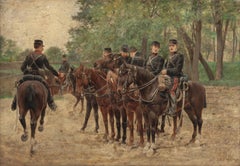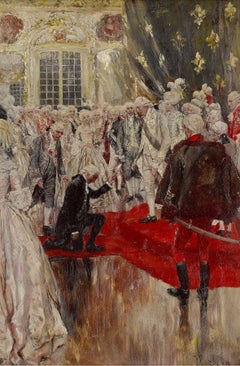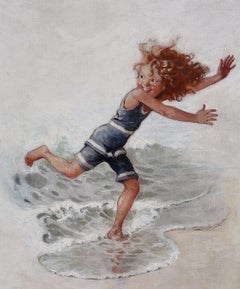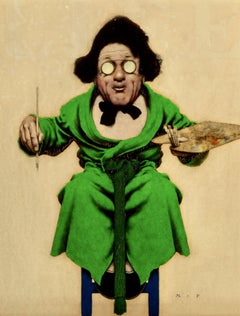Want more images or videos?
Request additional images or videos from the seller
1 of 6
Maxfield ParrishPrometheus1919
1919
About the Item
- Creator:Maxfield Parrish (1870-1966, American)
- Creation Year:1919
- Dimensions:Height: 31 in (78.74 cm)Width: 21.25 in (53.98 cm)
- Medium:
- Period:
- Condition:
- Gallery Location:Fort Washington, PA
- Reference Number:Seller: 21171stDibs: LU38431688453
About the Seller
5.0
Recognized Seller
These prestigious sellers are industry leaders and represent the highest echelon for item quality and design.
Established in 1995
1stDibs seller since 2016
139 sales on 1stDibs
Typical response time: 1 hour
Authenticity Guarantee
In the unlikely event there’s an issue with an item’s authenticity, contact us within 1 year for a full refund. DetailsMoney-Back Guarantee
If your item is not as described, is damaged in transit, or does not arrive, contact us within 7 days for a full refund. Details24-Hour Cancellation
You have a 24-hour grace period in which to reconsider your purchase, with no questions asked.Vetted Professional Sellers
Our world-class sellers must adhere to strict standards for service and quality, maintaining the integrity of our listings.Price-Match Guarantee
If you find that a seller listed the same item for a lower price elsewhere, we’ll match it.Trusted Global Delivery
Our best-in-class carrier network provides specialized shipping options worldwide, including custom delivery.You May Also Like
John Berney Ladbrooke, 19th Century oil painting of a river landscape
By John Berney Ladbrooke
Located in Harkstead, GB
A most attractive painting with an extensive view towards a church tower, just as a rain shower is approaching. The picture includes a charming little figure group of a mother holdin...
Category
Mid-19th Century Victorian Landscape Paintings
Materials
Panel, Oil
$1,676
Free Shipping
H 14.5 in W 12 in D 2 in
Portrait of a girl with a rose and a red coral necklace (c. 1631)
Located in Amsterdam, NL
David Finsonius (Veere 1597- Bergen op Zoom 1646/1648)
Portrait of a girl with a rose and a red coral necklace
With traces of the artist’s signature and annotated AETATIS S.V. 2 1⁄2 Ao 1631
Oil on panel, H. 104.5 x 79.5 cm
Provenance:
Purchased by Jonkheer Helenus Marius Speelman (1857-1909), Kasteel de Wittenburg; thence by
descent
The work shows a strong resemblance to a portrait by Finsonius in the North Brabant Museum. This
signed and dated "Girl with Basket and Cherries" (Inv. 15529), was painted just a year later, in 1632.
Not only are the paintings remarkably similar in overall size and format, in painting style, and in the
positioning of the girls in full length in their white lace dresses. They are also connected by the
iconographic scheme of the respective coral necklaces, each with a gold memorial medal hanging
from it. Although they are of course individuals, the faces are very similar in their depictions of
features such as eyes, nose, and lips. This points to the same technique applied by the same painter.
Finally, the handwriting is almost the same on the works by Finsonius known so far.
About the painter, David Finson named 'Finsonius' (related to the better-known Louis Finson...
Category
17th Century Dutch School Portrait Paintings
Materials
Oil, Wood Panel
$100,288
Free Shipping
H 41.15 in W 31.11 in D 1.58 in
Study of a dog
Located in Amsterdam, NL
Study of a dog
Oil on paper laid down on panel, 17.5 x 25.5 cm
Provenance
Private collection, the Netherlands
Note:
We are grateful to Mr Fred Meijer for his attribution to Ludolf de Jongh
Ludolf de Jongh was the son of a shoemaker. When his father moved to Rotterdam, the young Ludolf decided to learn art rather than shoemaking and became a pupil of Cornelis Saftleven. Later he studied under Anthony Palamedes in Delft and still later with Jan van Bijlert in Utrecht.
In 1635 he travelled to France with Francis Bacon. Seven years later, in 1642, he returned to the Netherlands when he heard that his mother had fallen ill. He set up a shop in Rotterdam, and his earliest signed paintings date from that year.
According to Houbraken, his travels had caused him to speak French so fluently, that his parents had to learn French in order to speak with him.
De Jongh’s work shows a strong influence from the Utrecht school of Caravaggio admirers, especially Jacob Duck...
Category
Mid-17th Century Old Masters Animal Paintings
Materials
Paper, Oil, Wood Panel
Shore Birds
Located in Salt Lake City, UT
"Shore Birds" by Gerald Purdy, oil on panel, 11 1/2 X 14 inches (framed size: 17 X 21 1/2 inches), $2,800.
"I chose narrative art from the menu and have ...
Category
2010s Figurative Paintings
Materials
Oil, Panel
Old Master Painting, Flemish Baroque, Religious Scene, Esau and Jacob, Lentil
By Erasmus Quellinus the Younger
Located in Greven, DE
Isaac and Rebecca had two sons: the twins Esau and Jacob. Esau was the first-born, giving him the birthright. Among Jews the birthright gave the eldest son authority over the family,...
Category
17th Century Baroque Figurative Paintings
Materials
Oil, Panel
$34,215
H 19.77 in W 25.04 in
Circle of Jacob Ruisdael, Landscape with Riders and a Well, Flemish Art
Located in Greven, DE
Circle of Ruisdael, Riders in a Landscape passing by a well
Category
17th Century Baroque Figurative Paintings
Materials
Oil, Panel
$1,887 Sale Price
20% Off
H 7.88 in W 10.04 in
Set of Eight Apostles, Portrait of Men, Head Studies, Flemish School, Van Dyck
Located in Greven, DE
Set of Eight Apostles
each oil on panel
each framed (different as some are golden, some are not, please view the photos)
So far there is no certain attribution. The style of the ser...
Category
17th Century Baroque Figurative Paintings
Materials
Oil, Panel
$28,316 Sale Price
20% Off
H 26.38 in W 22.05 in
Circle of David Teniers, Landscape with Peasants by an Inn and a River, Dutch
By David Teniers the Younger
Located in Greven, DE
Circle of Teniers, Peasants in a Landscape passing by a river and an Inn.
Category
17th Century Baroque Figurative Paintings
Materials
Oil, Panel
$3,539 Sale Price
25% Off
H 13 in W 17.33 in
Sacra Conversazione, Maria, Christ, Old Master, Religious, Baroque Painting, art
Located in Greven, DE
Attributed to Peter Candid / Pieter de Witte
(Bruges c. 1540 - 1628 Munich)
Sacra Conversazione
Oil on wood, 29 x 37 cm
The painter, sculptor and architect Peter Candid, known in Italy as Pietro Candido, was born in Bruges between 1540 and 1548. In the 1560s he stayed in Florence, where he worked in the workshop of Giorgio Vasari, with whom he collaborated on a number of commissions for the House of Medici. After a brief stay in Volterra, he went to Munich in 1586. For the next 42 years, until his death, he remained court painter to Duke William V...
Category
17th Century Renaissance Figurative Paintings
Materials
Oil, Panel
$49,760
H 11.42 in W 14.57 in
16th Century Parnassus Biagio Pupini called Biagio delle Lame Muses Oil on Panel
Located in Sanremo, IT
This painting (in an excellent state of conservation and of fine executive workmanship, attests to the enormous
luck of Raphael's inventions in the years following his death: in fact...
Category
16th Century Italian School Figurative Paintings
Materials
Oil, Panel
$11,680
H 22.84 in W 28.75 in D 1.19 in
More From This Seller
View AllFrench Military on Horseback
By Jules Delaunay
Located in Fort Washington, PA
Date: 1893
Medium: Oil on Panel
Dimensions: 14.50" x 21.00"
Signature: Signed and Dated Lower Right: J. Delaunay. 1893
Category
1890s Figurative Paintings
Materials
Oil, Panel
King Louis
By Howard Pyle
Located in Fort Washington, PA
Medium: Oil on Panel
Signature: Signed "H. Pyle" Lower Right and Inscribed Indistinctly On the Reverse
"At the same time he extended toward King Louis the ...
Category
1890s Figurative Paintings
Materials
Oil, Panel
$49,000
Little Girl Running from Waves, Original cover for The Saturday Evening Post
By Sarah S. Stilwell Weber
Located in Fort Washington, PA
The Saturday Evening Post Magazine, July 23, 1921 (cover illustration).
Sarah Stilwell-Weber is celebrated for her captivating illustrations of children. While her early work often ...
Category
1920s Figurative Paintings
Materials
Oil, Linen, Panel
A Dark Futurist
By Maxfield Parrish
Located in Fort Washington, PA
Medium: Oil on Paper Laid on Panel
Signature: Signed Lower Right
Initialed lower right: M.P.
Signed on the reverse: Maxfield Parish
Initialed and numbered by the artist's son on the reverse: M.P. Jr. / No. 68.
When Maxfield Parrish painted the comical A Dark Futurist in 1923 for Life magazine, he had already established himself as America's leading book and magazine illustrator. His early artwork for children's classics like L. Frank Baum's Mother Goose in Prose (1897), Kenneth Grahame's Dream Days (1900), and Eugene Field's Poems of Childhood (1904) popularized his signature atmospheric settings, cobalt blue-and-gold palette, and dreamy figures inhabiting magical worlds. Likewise, his covers for Century, Collier's, Harper's Bazaar, Ladies' Home Journal, Life, and Scribner's Magazine were highly desirous and instantly recognizable, often more stylized than his book imagery; no other journal illustrator could match Parrish's winning combination of precise draftsmanship, strong graphic design, and amusing characters.
According to David Apatoff, Art Critic, The Saturday Evening Post, "Parrish abandoned his customary heavy details and rainbow colors to present a bolder, more high-contrast design silhouetted against a stark white background - a treatment more suitable for a modern magazine cover vying for attention on a crowded newsstand.
A Dark Futurist is silhouetted against a white field with no background or details to prop it up. The composition is carefully centered with only differences in the hands and the artist's necktie to break the symmetry. These are crucial to the success of the design.
Just as important as Parrish's clean, high-contrast style in these pictures is the refreshing humor and sophistication in content, which is usually absent from Parrish's fairytale paintings.
A Dark Futurist shows us a different kind of modernism. Parrish steps out of his timeless fairy tales to tweak one of the most incendiary artistic movements of his day. Futurism, with its militant manifesto and its outspoken artists, was all the rage in Europe. Parrish pokes them, showing a "dark" and anxious futurist with pursed lips and thick glasses, poised to paint but not exactly sure of, or optimistic about, what the 'future' will hold. This suggests that Parrish was alert to, and had opinions about, current events of the day - something one might never guess from his usual subject matter."
In his early Collier's illustrations, Parrish also developed memorable themes that he would return to in his 1920s magazine work. One of his most popular characters was the "seer," or man with keen visual powers, most often depicted as an artist, but also appearing as a tourist, scientist, and philosopher. Parrish's seer was recognizable by particular physical attributes: round glasses, indicating his visual and analytical acuity, and an overcoat and/or hat signifying his role as observer of the outside world.
A Man of Letters, sold last year at Heritage Auctions, was one of the first Life covers Parrish rolled out for Gibson, and he repeated the character of the artist-seer, emphasizing the comic spin, for two later editions: A Dark Futurist (Life, March 1, 1923) captures a Parrish-like artist in foggy round glasses and a long green coat...
Category
1920s Figurative Paintings
Materials
Paper, Oil, Panel
Price Upon Request
Stan Laurel & Oliver Hardy - Comedians Traveling Road Sign
Located in Fort Washington, PA
This Stan Laurel and Oliver Hardy illustration was used as a traveling show sign for the comedy duo.
Medium: Oil on Wood Panel
Signature: Unsigned
Category
1940s Figurative Paintings
Materials
Wood, Oil, Panel, Wood Panel
Couple in a Horse-Drawn Carriage
By William Henry Dethlef Koerner
Located in Fort Washington, PA
Date: 1923
Medium: Oil on Panel
Dimensions: 24.00" x 36.00"
Category
1920s Figurative Paintings
Materials
Oil, Panel



